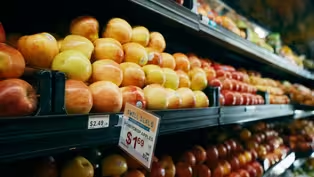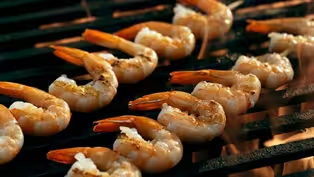
How Cereal, Sugar, and Big Business Rewired Our Diets
Clip: Season 2 Episode 1 | 6m 24sVideo has Closed Captions
Shane and Michael Moss examine how processed food took over our shelves — and our willpower.
Shane joins Pulitzer Prize-winning journalist Michael Moss joins to uncover how cereal sparked the rise of processed foods — and the billion-dollar marketing machine behind it. From sugar-loaded breakfasts to Big Tobacco’s food empire, this segment reveals how modern diets were engineered to override our willpower.
Problems playing video? | Closed Captioning Feedback
Problems playing video? | Closed Captioning Feedback

How Cereal, Sugar, and Big Business Rewired Our Diets
Clip: Season 2 Episode 1 | 6m 24sVideo has Closed Captions
Shane joins Pulitzer Prize-winning journalist Michael Moss joins to uncover how cereal sparked the rise of processed foods — and the billion-dollar marketing machine behind it. From sugar-loaded breakfasts to Big Tobacco’s food empire, this segment reveals how modern diets were engineered to override our willpower.
Problems playing video? | Closed Captioning Feedback
How to Watch Human Footprint
Human Footprint is available to stream on pbs.org and the free PBS App, available on iPhone, Apple TV, Android TV, Android smartphones, Amazon Fire TV, Amazon Fire Tablet, Roku, Samsung Smart TV, and Vizio.
Buy Now

Surprising Moments from Human Footprint
Do you think you know what it means to be human? In Human Footprint, Biologist Shane Campbell-Staton asks us all to think again. As he discovers, the story of our impact on the world around us is more complicated — and much more surprising — than you might realize.Providing Support for PBS.org
Learn Moreabout PBS online sponsorship♪ Food companies understand that there are a few basic ingredients we simply can’t resist.
(sugar crystals clatter softly) The rise of those ingredients, and the birth of modern marketing, are tied to one food.
...from the future... And you can probably guess which one.
(man) It actually started with cereal.
-(cello strike) -(mellow music) (Shane) Meet Pulitzer Prize-winning journalist Michael Moss.
♪ On the cello, he’s just a beginner.
But as an investigative reporter, Michael’s a veteran.
And his books on the food industry are New York Times best sellers.
(Michael) At the turn of the century, there was this guy named John Harvey Kellogg.
Physician.
-(soft music) -(boat horn beeps) (Shane) Americans were suffering from an epidemic called dyspepsia, an ailment of bloated, gaseous stomachaches related to their diet.
(Michael) And at one point he came up with this cereal that was devoid of sugar and salt, and it had, like, whole grains.
And all might have been fine, except he had a little brother named Will.
(Shane) Will Kellogg was more interested in making money than his brother was.
And he saw big business in cereal.
-(machinery clanking) -(grains whooshing) (Michael) Dr. Kellogg is, like, off in Europe at some point, and Will--Will’s in charge.
"What if we just add, like, one extra element here?
What would that do to sales?"
(sugar crystals clatter softly) And, of course, that element was sugar.
(whooshing sound) Sales went bonkers.
The customers loved it.
Dr. Kellogg came back and was appalled.
They went to court twice over this.
That must be one of the most epic sibling fights in all of modern history.
Well, it was a fight over the health and well-being of, like, gazillions of people.
(mellow music) (Shane) The Kellogg brothers had a rival.
Inspired by their success, a man named C.W.
Post began selling his own sweetened cereals.
(Michael) What Post realized is that the real thing that could set him apart was, like, marketing.
(machinery whirring) (Shane) Post launched some of America’s earliest food marketing campaigns, and it paid off in millions.
(soft music) (Michael) That evolution of cereal epitomized what makes processed food so powerful.
(Shane) As the century unfolded, America’s food companies came of age, investing billions in marketing and food science that tapped into our biological pull toward sugar, salt, and fat.
(mellow music) (Michael) Back in the ’70s, a dentist pulled out all his favorite brands of cereal, tested them, and was shocked to find that so many brands of cereal, ostensibly good for us, had, like, more sugar than candy.
(Shane) And these cereals weren’t just marketed to the adults who bought these foods but directly to the children who ate them.
(Michael) Back in the ’70s, somebody did a study.
And they counted up and measured all the advertising that was going on.
(soft music) (Shane) Over a nine-month period during the hours when children most watched TV, there were 3800 ads for sugar cereals, 1600 for candy and gum, and for unsweetened foods like meat, fish, or vegetables, only four.
But proposing new government regulations in the 1980s was a nonstarter.
♪ (Ronald Reagan) We must remove government’s smothering hand from where it does harm.
Fellow conservatives, our time is now.
-(static) -Look like mini footballs!
(Shane) Giant corporations kept selling us addictive, unhealthy products with manipulative advertising.
Sweet, colorful, bursting with fruity... (Shane) Sound familiar?
-(lighter strikes) -(cigarette burns) That’s no coincidence.
(Michael) Back in the ’80s, the biggest tobacco company in the world, Philip Morris, was rolling in cash.
Guess what they spotted as being a natural extension of their tobacco business?
Processed food.
(Shane) First, they bought food giant General Mills, followed by Kraft, and then Nabisco.
By the early ’90s, Philip Morris was the largest producer of food in the world.
And you can see through the documents the tobacco guys lent some of their best marketing strategies to the food guys.
(Shane) Addictive products plus slick marketing, it’s a formula for success.
♪ Today, most of the products on grocery store shelves are highly processed.
♪ Meanwhile, a billion people are living with obesity.
And another 2.5 billion are overweight.
♪ That’s up more than 40% since 1970.
And research connects this trend and its many health consequences with the ubiquity of processed foods on supermarket shelves.
(Michael) One could argue that those products and our huge dependency on processed food has been one of the biggest manmade disasters, health disasters of our time.
(wind howling) (Shane) When you’re taking all this in, where does the responsibility lie?
(mysterious music) (Michael) These products we’re talking about are designed, in a way, to kind of destroy our free will.
♪ It’s really hard to regain control of that, you know, having a lifetime experience of them telling us what we should love.
(traffic whirs) (Shane) But whether they land in our carts by choice or coercion, the products we scan at the checkout counter are completing the last step in an epic journey through a global supply chain.
(soft, eerie music) ♪ Seamless and invisible, that supply chain connects us and the food we eat to places and people around the world.
(energetic music) ♪
The Birth of the Supermarket: How Convenience Took Over the Way We Shop
Video has Closed Captions
Clip: S2 Ep1 | 4m 18s | Shane and Ben Lorr trace the supermarket’s rise — and what it says about what we value. (4m 18s)
The True Cost of Shrimp: What the Grocery Store Doesn’t Show You
Video has Closed Captions
Clip: S2 Ep1 | 13m 11s | Shane uncovers the hidden labor behind shrimp — and the global systems that keep us in the dark. (13m 11s)
Providing Support for PBS.org
Learn Moreabout PBS online sponsorship
- Science and Nature

Explore scientific discoveries on television's most acclaimed science documentary series.

- Science and Nature

Capturing the splendor of the natural world, from the African plains to the Antarctic ice.












Support for PBS provided by:

